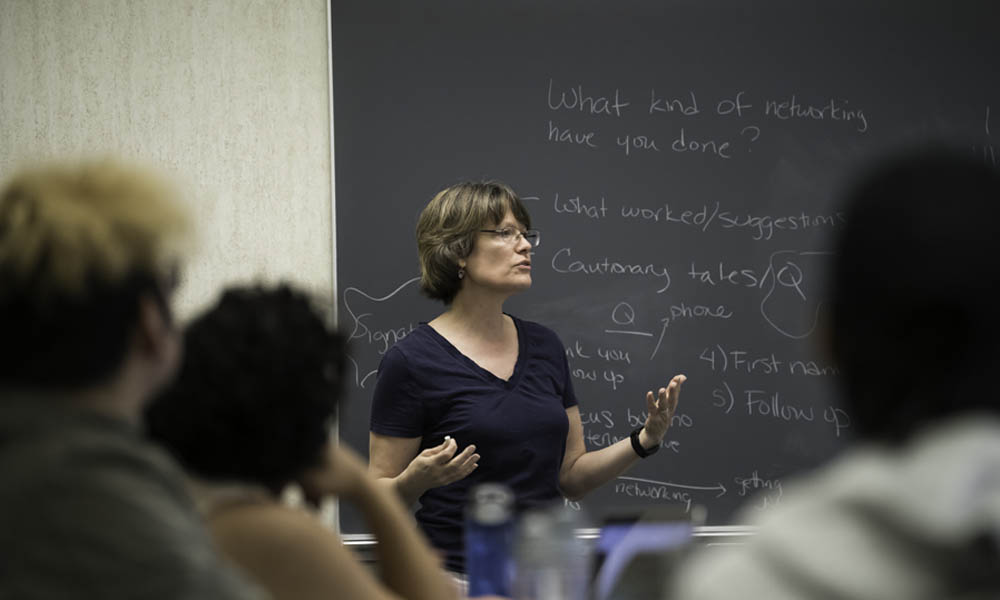Katherine Schaefer spent eight years as an RNA biochemist and 13 more as an immunologist. Along the way, she became increasingly interested in what she calls a scientist’s “bread and butter”—the art of writing.
“I’d like to offer my readers a refund on my first couple of papers,” she says with a laugh. “The science was great, the writing not so much. I didn’t really know what I was doing.”
So when she was offered an adjunct position by the Writing, Speaking, and Argument Program in 2009, she jumped at the chance and spent a year teaching first-year composition while keeping her position as an assistant professor in the Department of Gastroenterology and Hepatology at the Medical Center.
What Students Are Saying
“Professor Schaefer was one of the most helpful and supportive instructors I had at Rochester. I wasn’t a strong writer when I began college. I remember sitting in her office telling her what I wanted to write about while she created a flow chart on the whiteboard. I now create flow charts for every paper I write.”
—Alexandra Born ’15, structural biology and biochemistry PhD candidate, University of Colorado Denver–Anschutz Medical Campus
“Professor Schaefer continuously encouraged me to push my boundaries and work toward my goals, whether it be a better version of my resume or an eloquent reason why I want to go to medical school. She was also always available to help me in any way, even after I wasn’t her student anymore.”
—Yoonjung Choi ’19
“An important aspect of her interactions with students is her ability to provide just the right amount of structure, yet allow the student some independence. For our final research paper, she gave us the opportunity to research any health inequity of our choice. Having this liberty allowed me to share something I was very passionate about.”
—Tishana Foster ’21
“I don’t think I slept much that year, but it allowed me to make the decision with open eyes,” Schaefer says. “When they offered me a full-time position here in 2010, I transferred. And I’ve thoroughly enjoyed it.”
Now as an associate professor of instruction, Schaefer teaches introductory composition, upper-level writing in biology, and courses on genre theory and application, while also supporting writing instruction in the majors. She cites four issues that intrigue her:
- How do the needs of scientists—to develop questions, execute research, and communicate results—influence how they write?
- How does the changing landscape of science influence the way scientists promote their work?
- How do different scientific fields adapt basic science writing to their needs? For example, how (and why) do an RNA biochemist and an immunologist write differently?
- How can emerging scientists understand writing as a series of choices that let them best develop and present their work?
“Scientists have to convey how they came up with their questions and really convey what they did in a convincing way that’s going to make the reader go, ‘Yeah, they did their research right. They did all the controls,’” she says. “That’s the theme of all of my teaching and all of my research these days.”
The goal of the Writing, Speaking, and Argument Program is to familiarize students with key principles and strategies for becoming successful communicators. “We’re involved in helping students investigate what it means to communicate effectively in whatever scenarios they want to communicate in,” Schaefer says.
“I was always the one mentoring the undergraduates and helping everyone write their papers,” she says.
Schaefer says her “lecture-based” teaching was dry and didn’t place an emphasis on student feedback. That changed when she joined the Writing, Speaking, and Argument Program, and it resulted from her role as a student, not a teacher.
“I took a pedagogy course, and it’s amazing what I learned about teaching,” she says. “I had people in my own program watching me teach and providing feedback, and it changed my entire philosophy. I learned that every student is different, and 99.9 percent of my teaching philosophy now is about finding out where students are and what they need, without making assumptions about what they know. I’ve realized that the most important thing going on in a classroom isn’t necessarily what I say.”
When Schaefer left the Medical Center, she worried that the switch meant she was no longer a biologist. Her friend and colleague, associate professor of biology Cheeptip Benyajati, assured her she was. “She continued to tell me that until I believed it, and it really made a difference. You spend 30 years in one profession and then do something else, it’s just going to cause insecurity.”
Her security comes from her students and their writing.
“It’s amazing what I learn just from reading my students’ papers,” she says. “The world is a richer place because I’m seeing it through so many people’s eyes.”
Winning a Goergen Award for Excellence in Undergraduate Teaching is extra special because of her career change.
“My department head was willing to take a chance on this weird scientist who dropped in her office and said, ‘Hi, I’d like to teach writing,’’’ Schaefer says. “There’s just a community here—sharing, teaching, and learning from each other. And I see this award as holding up the value of that.”




